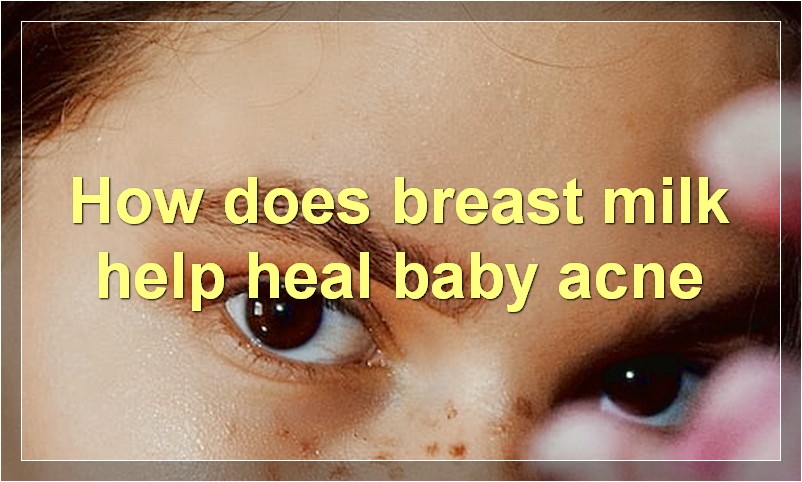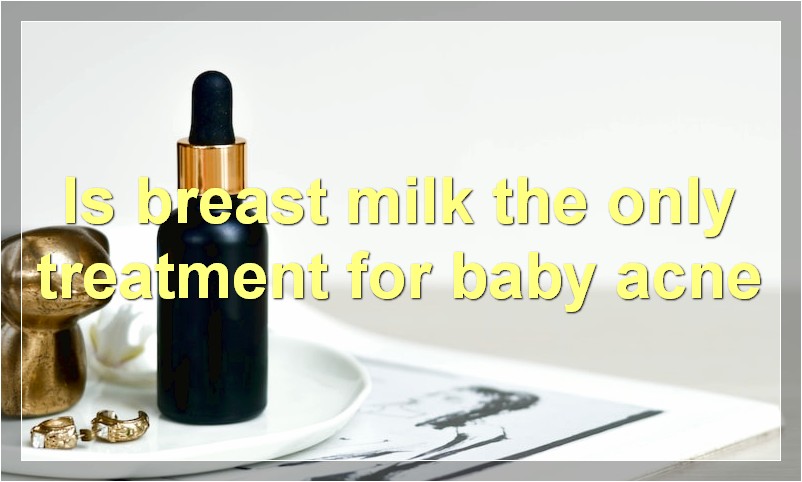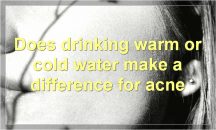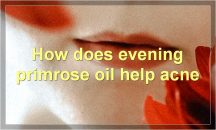Breast milk is packed with nutrients that can help boost your baby’s health, including helping to clear up baby acne.
What are the benefits of breast milk for baby acne
Acne is a common skin condition that affects people of all ages. While acne is often associated with adolescence, it can also affect babies and young children. Baby acne is a temporary condition that usually appears within the first few weeks after birth. It typically disappears within a few months, without any treatment.
While the exact cause of baby acne is unknown, it is thought to be related to the mother’s hormones. These hormones are passed from the mother to the baby through the placenta during pregnancy. After birth, the baby’s exposure to these hormones decreases, which may trigger the development of acne.
Baby acne is characterized by small, red bumps on the face. These bumps are similar to those seen in teenage acne, but they are usually not as severe. Baby acne does not require any treatment and will typically resolve on its own within a few months. However, some parents may choose to treat their child’s acne with a gentle cleanser or lotion.
Breast milk has many benefits for both mothers and babies. One of these benefits is its ability to help heal and prevent baby acne. The fatty acids in breast milk have anti-inflammatory properties that can help reduce redness and swelling associated with acne. Additionally, the antibodies in breast milk can help protect your baby’s skin from infection.
To use breast milk as a treatment for baby acne, simply apply a small amount to a cotton ball and gently wipe it over your baby’s face. You can do this once or twice daily until the acne clears up. Be sure to wash your hands before and after applying breast milk to your baby’s skin. You should also avoid using any harsh soaps or cleaners on your baby’s skin while they have acne.
In addition to treating baby acne, breast milk can also be used as a preventive measure. If you notice that your baby is starting to get red bumps on their face, you can try applying breast milk before bedtime. This will help to soothe your baby’s skin and prevent the bumps from getting worse overnight.
If you are concerned about your child’s acne, talk to their pediatrician. They can provide you with additional information and resources about treating and preventing baby acne.
How does breast milk help heal baby acne

Acne is a common skin condition that affects people of all ages. Although it is often associated with puberty, it can also affect infants. Baby acne is a temporary condition that usually appears within the first few weeks after birth. It is characterized by small, red bumps on the face and body.
While the exact cause of baby acne is unknown, it is believed to be related to hormones passed from the mother to the infant during pregnancy. Breast milk may also play a role in the development of baby acne. Some experts believe that breast milk contains substances that can irritate the skin, causing inflammation and pimples.
Despite its name, baby acne is not caused by poor hygiene. In fact, washing your baby’s face too often can actually make the condition worse. Baby acne will usually clear up on its own within a few weeks or months. However, there are some things you can do to help relieve your baby’s discomfort and speed up the healing process.
One of the most effective treatments for baby acne is breast milk. The fatty acids in breast milk have anti-inflammatory properties that can help reduce redness and swelling. Additionally, breast milk contains immune-boosting antibodies that can help fight off infection and promote healing.
To use breast milk as a treatment for baby acne, simply apply it to the affected areas with a clean cotton ball or cloth. You can do this as often as needed until the acne clears up. You can also try expressing some breast milk into a cup and applying it to your baby’s skin with a soft washcloth.
If you’re concerned about your baby’s appearance while they have acne, don’t hesitate to talk to your pediatrician. They can offer reassurance and provide guidance on how to best care for your child’s skin.
What are the best ways to prevent and treat baby acne
Acne is a common skin condition that affects people of all ages. While it is most commonly associated with teenagers, acne can also affect infants and young children. Baby acne is a temporary condition that usually occurs on the face, but can also occur on the chest and back. Baby acne is not caused by dirt or poor hygiene, but is instead due to hormones that are passed from the mother to the child during pregnancy.
There are several things that you can do to prevent and treat baby acne. First, try to keep your baby’s face clean. Wash the face with a mild soap and water twice a day. Be sure to remove all makeup before washing. You should also avoid using harsh cleansers or scrubbing the face too hard, as this can irritate the skin and make the acne worse.
If your baby’s acne does not improve with home treatment, you may need to consult a dermatologist. A dermatologist can prescribe medication that will help to clear up the acne. In most cases, the acne will go away on its own within a few months. However, if the acne is severe, the dermatologist may recommend a course of antibiotics.
How long does it take for breast milk to help baby acne
Acne is a common skin condition that affects people of all ages. While it is most commonly associated with adolescence, acne can also affect babies and young children. Baby acne is thought to be caused by the same factors that cause acne in adults, including hormones and excess oil production. However, there is one major difference between adult acne and baby acne: breast milk.
Breast milk has been shown to have many benefits for babies, including helping to clear up baby acne. In one study, infants who were fed breast milk had significantly less acne than those who were not fed breast milk (1). The exact mechanism by which breast milk helps to clear up acne is not fully understood, but it is thought to be due to the presence of certain compounds in breast milk that have anti-inflammatory and antibacterial properties (2).
So, how long does it take for breast milk to help baby acne? The answer seems to be fairly quickly. In the study mentioned above, the infants who were fed breast milk had significantly less acne at 2 weeks of age than those who were not fed breast milk (1). So, if you are looking for a natural way to help clear up your baby’s acne, breast milk may be worth a try.
What do experts say about using breast milk for baby acne
When it comes to dealing with baby acne, experts say that breast milk may be the best natural remedy available. Breast milk contains antibodies that can help fight off the bacteria that can cause acne. In addition, the lauric acid in breast milk can help kill the Propionibacterium acnes bacteria that can cause inflammation and redness.
To use breast milk to treat baby acne, simply apply a small amount of breast milk to a cotton ball and dab it on the affected areas. Allow the milk to dry on the skin, and then rinse it off with warm water. For best results, repeat this process twice a day until the acne clears up.
If you don’t have access to breast milk, you can also try using a homemade honey and oatmeal mask. Simply mix together one tablespoon of honey and one tablespoon of oatmeal, and then apply it to the affected areas. Leave the mask on for 15 minutes, and then rinse it off with warm water.
Is breast milk the only treatment for baby acne

Acne is a very common skin condition that affects people of all ages. However, it is most commonly seen in teenagers and young adults. Baby acne is a temporary condition that usually appears within the first few weeks after birth. It typically resolves on its own within a few weeks to months.
There are many different treatment options for acne, both topical and oral. However, breast milk has been shown to be an effective treatment for baby acne. In one study, infants who were treated with breast milk had a significantly higher rate of resolution of their acne than those who were treated with water or nothing at all.
There are several possible explanations for why breast milk may be effective in treating baby acne. First, it is rich in nutrients and antibodies that can help to boost the immune system. Second, it contains fatty acids that can help to reduce inflammation. Finally, it is thought to have a calming effect on the skin.
If you are concerned about your baby’s acne, talk to your pediatrician. He or she can help you to determine whether or not breast milk is the best treatment option for your child.
What are the possible side effects of using breast milk for baby acne
There are many possible side effects of using breast milk for baby acne. The most common side effect is that the baby may have an allergic reaction to the milk. This can cause the baby’s skin to break out in a rash. Another possible side effect is that the baby may develop diarrhea.
How often should I feed my baby breast milk to help with baby acne
Acne is a common skin condition that affects people of all ages. Though it is often associated with puberty, it can also affect infants and young children. Baby acne is a common condition that affects approximately 20% of newborns. Though it is not harmful, it can be unsightly and cause parents anxiety.
There is no one definitive answer to the question of how often to feed your baby breast milk to help with baby acne. Some experts recommend feeding on demand, while others suggest limiting feedings to every two to three hours. Ultimately, the best course of action is to consult with your child’s pediatrician to determine what is best for your individual child.
In addition to frequency of feedings, there are a few other things you can do to help reduce the incidence of baby acne. Be sure to wash your hands thoroughly before handling your baby. Additionally, avoid using harsh soaps or cleansers on your baby’s skin. And, lastly, try to keep your baby’s face clean and dry.
While baby acne is a common and typically harmless condition, it can be frustrating for parents. By following the advice of your child’s pediatrician and taking some simple precautions, you can help reduce the incidence of baby acne and keep your little one comfortable and happy.
How will I know if breast milk is helping my baby’s acne
Acne is a common skin condition that affects people of all ages. The causes of acne are not fully understood, but it is thought to be related to hormones, genetics, and the environment. Breast milk has been shown to be an effective treatment for acne. In one study, infants who were fed breast milk had significantly less acne than those who were not fed breast milk. Breast milk contains many nutrients that are beneficial for the skin, including proteins, essential fatty acids, and vitamins A and E. These nutrients help to keep the skin healthy and prevent acne from developing. If you are concerned that your baby’s acne is not improving with breast milk, talk to your doctor or dermatologist.
What should I do if I think my baby’s acne is getting worse
If you think your baby’s acne is getting worse, there are a few things you can do. First, try not to worry. It’s common for babies to have acne, and it usually goes away on its own within a few weeks or months. Second, keep your baby’s skin clean. Wash your baby’s face with a mild soap and water once a day. You can also use a soft washcloth to gently remove any crusting or scale that may be present. Finally, talk to your pediatrician if the acne persists or seems to be getting worse.





